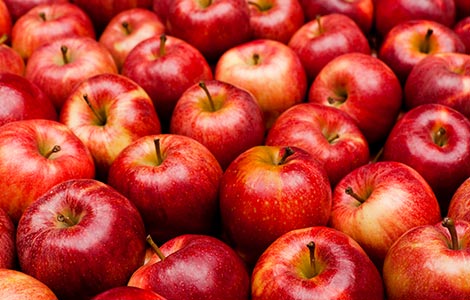
- Boron (B) is essential for all plant growth. It is import for cell wall structure, root growth, and pollination.
- Apples require an adequate supply of available boron, especially during flower formation and fruit set.
- Foliar sprays of Solubor® during the dormant season, pre-pink and early bud stages will ensure an adequate supply of boron during the critical stages of flowering and fruit development.
- Apples are sensitive to over-applications of boron, and boron toxicity can result if the recommended boron application methods and rates are not carefully followed.
- Apples appear to grow best in sandy soils, but these soils also tend to be low in available boron, which is a key nutrient for tree growth—especially fruit set and quality.
While boron is essential for all stages of plant growth, an available supply is most important during flowering and fruit development. This is because of the high demand for boron from rapidly growing plant tissues such as pollen tubes. Foliar applications with Solubor at pre-pink/pink stage will ensure an adequate supply of boron during these critical reproductive stages. Cell wall strength, cell division, as well as fruit and seed development are some of the plant functions related to boron.
Apples require an adequate supply of available boron
Available boron in the soil is mainly associated with organic matter content, which must be mineralized to release boron for plant uptake. While boron requirements for optimum plant nutrition are low compared with those of the primary nutrients, the need for boron is especially significant in fruit development.
Deficiency symptoms
Because boron is vital to flower formation and fruit set, a decrease in boron supply during this critical stage can result in decreased yields. Boron deficiency results in reduced tree vigor and growth, and a severe deficiency may cause twig die-back, the formation of leaf rosettes, and bud drop.
Fruit “corking“ (darkening of internal tissues) is another boron deficiency symptom. “Bitter pit” or tissue breakdown is another symptom because boron is involved in the movement of calcium in plant tissues.
Soil tests and plant analyses
Boron deficiencies may be suspected on light-textured soils where organic matter content is low, on soils with a pH above 7.0, and on recently limed soils. Soil testing and plant analyses are both helpful in assessing the potential boron-supplying capacity of the soil and the current boron status of the growing plant.
The critical level of hot-water-soluble boron for apples in most soils is less than 0.5 ppm, depending on the soil pH, organic matter content and texture. The critical level of boron in the top mature apple leaves is about 25 ppm, and the ideal range is 35-50 ppm.
Trees with leaf boron contents below the critical level should be sprayed one or more times with Solubor before flower formation and fruit set, or with dormant sprays when flower buds begin development for the next crop. Trees with leaf boron levels higher than 50 ppm should not be sprayed.
Recommendations for apples
Yield responses to applied boron may be inconsistent and seasonal, probably due to environmental effects on growth. However, both yield and quality of apples may be improved with boron fertilization because available boron levels are low in some soils.
Apples are sensitive to over-applications of boron, and toxicity can result if the recommended boron application rates are not carefully followed.
Boron should be applied for apples, especially on sandy soils in high rainfall regions or with over-irrigation, because soluble boron can be easily leached from the root zone.
Response to applied boron generally is greatest when there are adequate supplies of other nutrients. While boron recommendations for apples vary from state to state, two general types of recommendations are commonly given.
Charts are located in the PDF.
Download Agronomy Notes